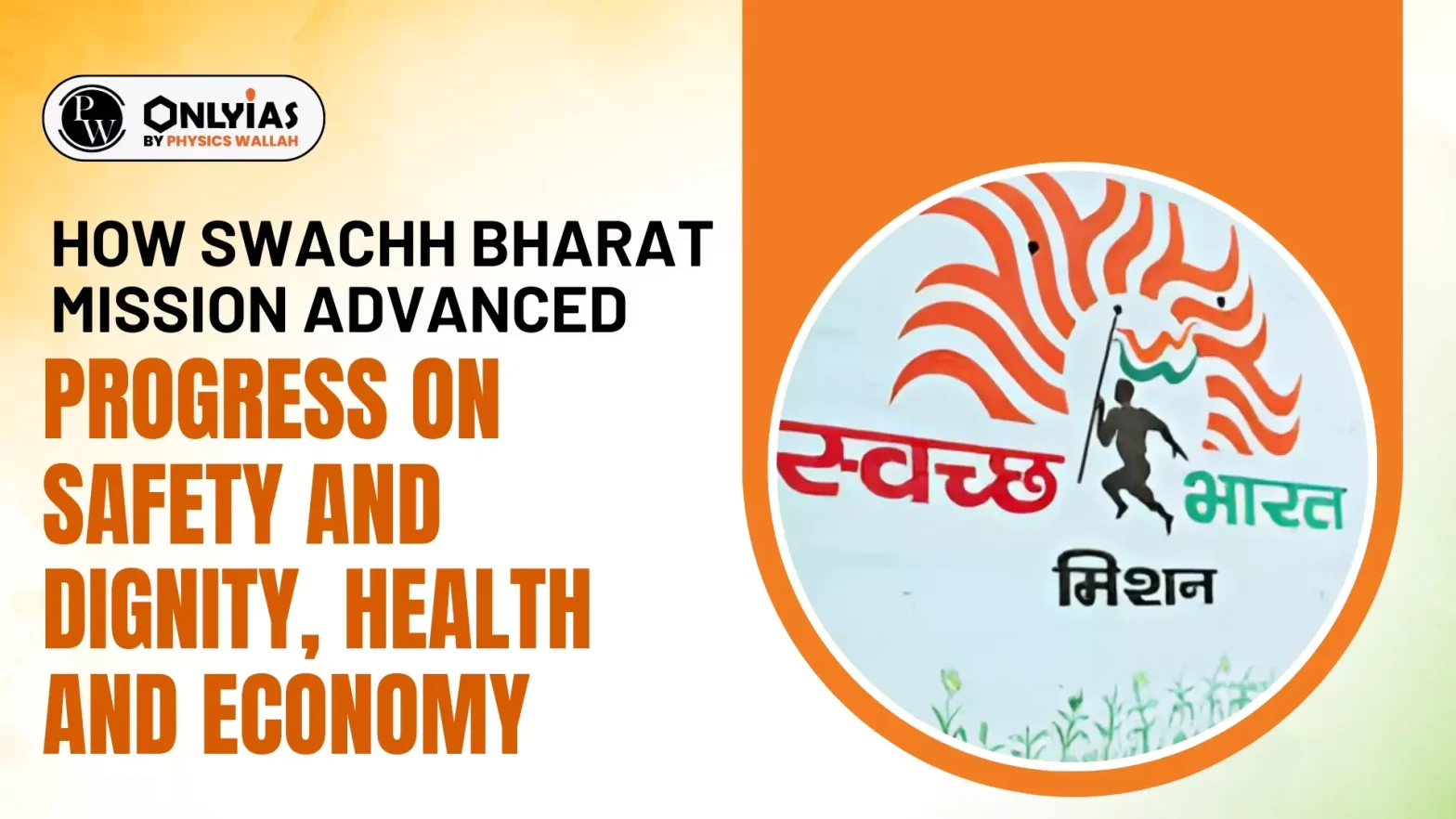A decade into the Swachh Bharat Mission (SBM) offers a timely opportunity to assess its progress and accomplishments.
About Swachh Bharat Mission (SBM)
- Announcement: The Mission was announced by Prime Minister Narendra Modi during his Independence Day speech from the Red Fort on August 15, 2014, the SBM was officially launched on October 2, 2014. This marked a historic moment, as it was the first time a head of government publicly committed to ending open defecation within a specified timeframe. The initiative was particularly significant because sanitation had previously been a taboo topic and rarely discussed openly.
- Goal: The SBM aimed to transform the sanitation behaviour of 550 million people within a five-year timeframe—a scale previously unimaginable. Additionally, the mission set a target to construct 100 million toilets.
- Execution: Within five years, by 2019, the goal of achieving an Open Defecation Free (ODF) India began to be implemented state by state. The mission gradually became a widespread public movement, evolving into a “Jan Andolan” (people’s movement)
- The program was executed through direct communication with the public via multiple platforms, including the Prime Minister’s monthly “Mann Ki Baat” radio address.
- Community Engagement: The SBM encouraged community and village-led initiatives, fostering a sense of pride and friendly competition among villages, districts, and states as they strived to achieve and declare ODF status. Villages celebrated their success with a “Gaurav Yatra” (pride tour).
By October 2, 2019, all states had declared themselves ODF, marking the successful completion of Phase 1. The focus then shifted to Phase 2, which emphasises sustaining these achievements. This includes ensuring that the toilets remain operational and preventing a return to open defecation.
Enroll now for UPSC Online Course
| Parameswaran Iyer:
Parameswaran Iyer is an Indian civil servant and currently serves as the Executive Director at the World Bank Group, representing Bangladesh, Bhutan, India, and Sri Lanka. Previously, Mr. Iyer was the Chief Executive Officer of NITI Aayog, India’s National Think Tank, from July 2022 to February 2023. He is also the driving force behind the Swachh Bharat Abhiyan, a campaign aimed at eradicating open defecation by constructing over 90 million toilets in rural India, and ensuring its success. |
Benefits of the Swachh Bharat Mission (SBM)
- Health: The Swachh Bharat Mission has led to significant health benefits, including a reduction in the spread of diseases such as diarrhoea. The mission has contributed to preventing child deaths under the age of five by improving sanitation and hygiene.
- Social: The SBM has enhanced dignity and security for women and girls. The importance of toilets for safety and dignity was highlighted in the film Toilet: Ek Prem Katha. The film emphasised how toilets were initially undervalued and demonstrated their crucial role in ensuring women’s safety and security.
- Economic: A UNICEF study estimated that achieving ODF status in a village saved each household approximately Rs 50,000 annually through reduced medical expenses and time savings. Additionally, a cartoon from the annual Sudhir Dar SBM calendar humorously depicted a bored doctor at a primary health centre, no longer seeing patients due to the reduction in diarrhoea cases.
Lesson for the global Community
- The SBM provides valuable lessons and experiences for the global community. At the Mahatma Gandhi International Sanitation Convention in October 2018, Prime Minister Modi, along with the Secretary-General of the United Nations, chaired the event, which was attended by 55 Health and Sanitation Ministers from developing countries.
- During the convention, PM Modi shared SBM’s successes and the large-scale changes it has brought about. This inspired other nations to initiate similar programs in their own countries.
- For instance, the Nigerian Minister for Water and Sanitation, inspired by the conference, launched the Clean Nigeria Campaign upon returning to his country.
|
Reason behind the Success of the Swachh Bharat Mission (SBM)
The Success of the Swachh Bharat Mission is encapsulated in the Delhi Declaration, which highlights the four Ps:
- Political Leadership: PM Modi’s leadership demonstrated that strong willpower and decisive action can overcome challenges and drive progress. Effective leadership is crucial for making tough decisions and achieving goals.
- Public Financing: Government funding is essential for such initiatives. The SBM benefited from substantial financial support, which facilitated the construction of toilets and other infrastructure.
- Partnerships: Collaboration among all stakeholders is vital. The SBM succeeded due to partnerships with state governments, private sector players, and other entities.
- People’s Participation: No initiative can succeed without broad public support. The SBM’s effectiveness was largely due to high levels of community involvement and participation.
These principles are now globally recognized as essential for the success and full implementation of large-scale, transformational development programs. Many other states are adopting these principles to advance their own sanitation initiatives, contributing significantly to Sustainable Development Goal 6: Access to sanitation and water.
Check Out UPSC CSE Books From PW Store
Conclusion
The Swachh Bharat Mission is one of several successful government schemes aimed at improving the quality of life for ordinary Indians. Other notable initiatives include Ujjwala (providing cooking gas cylinders), Jan Dhan (offering bank accounts), the Awas Yojana (housing), Ayushman Bharat (medical insurance), and the Jal Jeevan Mission (supplying clean water to 180 million households). These programs exemplify how large-scale initiatives can drive substantial progress. The principles of Jan Bhagidari—along with key factors such as political leadership, public financing, and partnerships—are crucial and should be applied when launching similar large-scale initiatives.
![]() 11 Sep 2024
11 Sep 2024
